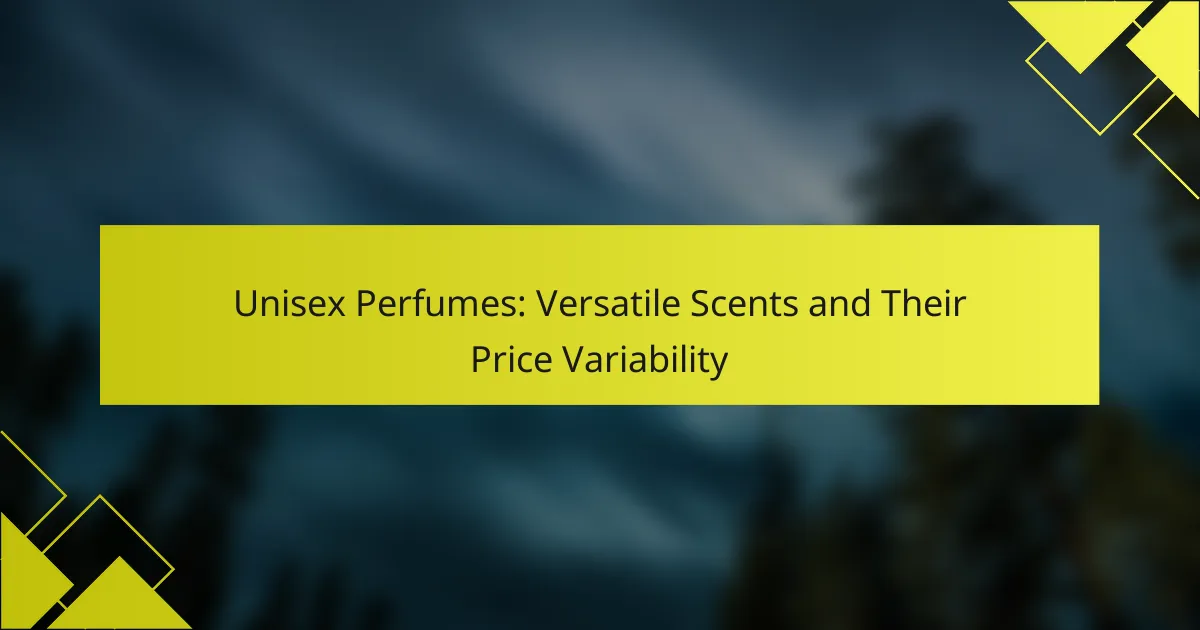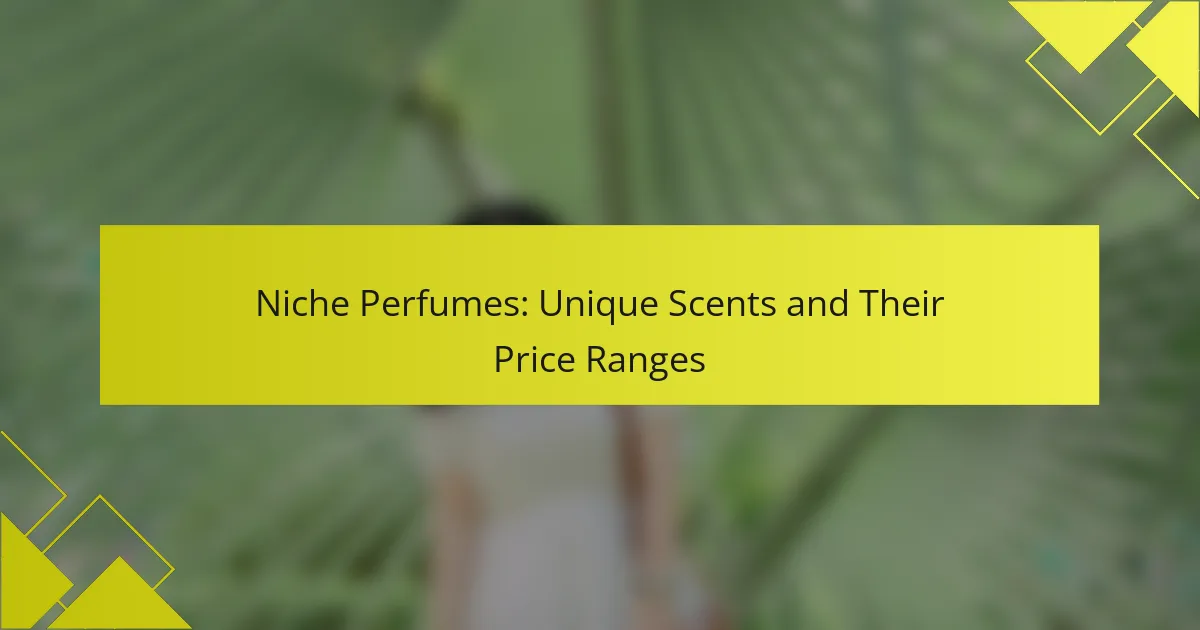
What are Luxury Perfumes?
Luxury perfumes are high-end fragrances crafted with premium ingredients. They often feature unique scent compositions that distinguish them from mass-market options. These perfumes typically have a higher concentration of fragrance oils, resulting in longer-lasting scents. The production process involves meticulous attention to detail, often including artisanal techniques. Luxury perfumes may incorporate rare ingredients, such as exotic flowers or rare woods. They are often presented in elegantly designed bottles that reflect the brand’s identity. The exclusivity and high-quality craftsmanship contribute to their elevated price point. Many luxury perfumes are associated with prestigious fashion houses or renowned perfumers, enhancing their desirability.
How are Luxury Perfumes defined in the fragrance industry?
Luxury perfumes are defined in the fragrance industry as high-end fragrances that emphasize quality, exclusivity, and artistry. These perfumes typically use rare and premium ingredients. The production process often involves meticulous craftsmanship and attention to detail. Luxury perfumes are usually sold in limited quantities to enhance their exclusivity. They often come in elegantly designed packaging, reflecting their premium nature. Additionally, luxury perfumes are marketed through prestigious brands, often associated with high fashion. The price point for luxury perfumes is significantly higher than mass-market fragrances, justifying their status through quality and brand prestige.
What distinguishes luxury perfumes from regular perfumes?
Luxury perfumes are distinguished from regular perfumes primarily by their quality of ingredients and craftsmanship. Luxury perfumes often use natural and rare ingredients, which enhance their scent profile. Regular perfumes typically contain synthetic components that may dilute the fragrance’s complexity. The concentration of fragrance oils in luxury perfumes is generally higher, leading to a longer-lasting scent. In contrast, regular perfumes may have a lower concentration, resulting in a shorter wear time.
Additionally, luxury perfumes are often packaged in exquisite bottles, reflecting the brand’s commitment to aesthetics and artistry. Regular perfumes may use simpler packaging to reduce costs. The branding and marketing of luxury perfumes emphasize exclusivity and prestige, often targeting a niche market. This contrasts with regular perfumes, which aim for mass appeal.
The price point of luxury perfumes is significantly higher, justifying the investment in superior ingredients, design, and marketing strategies. For instance, some luxury brands may charge several hundred dollars for a bottle, while regular perfumes typically range from $30 to $100.
What are the key characteristics of luxury perfumes?
Luxury perfumes are distinguished by their high-quality ingredients, unique scent compositions, and exquisite packaging. They often utilize rare and natural materials, such as essential oils from flowers, fruits, and spices. This commitment to quality results in richer, more complex fragrances.
Luxury perfumes typically feature intricate layering of notes, including top, middle, and base notes that evolve over time. This complexity creates a more engaging olfactory experience.
The packaging of luxury perfumes is often meticulously designed, using premium materials and artistic elements. This enhances the overall brand experience and reflects the exclusivity of the product.
In addition, luxury perfumes often come with a higher price point, justified by the craftsmanship, sourcing of ingredients, and brand heritage. For instance, brands like Chanel and Dior have established reputations for excellence in perfume-making, further elevating their products’ desirability.
Why do people choose Luxury Perfumes?
People choose luxury perfumes for their unique, high-quality ingredients and craftsmanship. Luxury perfumes often feature rare and exotic components. These ingredients contribute to a richer and more complex scent profile. Many consumers appreciate the exclusivity associated with luxury brands. The packaging and branding of luxury perfumes also enhance their appeal. Additionally, luxury perfumes often provide a sense of status and sophistication. Research indicates that consumers are willing to pay a premium for perceived quality and brand prestige. According to a study by Mintel, 47% of consumers associate luxury perfumes with a higher status.
What emotional connections do luxury perfumes create?
Luxury perfumes create deep emotional connections by evoking memories and enhancing personal identity. They often trigger nostalgia through familiar scents associated with significant life events. This emotional resonance can foster a sense of comfort and security. Additionally, luxury perfumes are often tied to status and sophistication, influencing how individuals perceive themselves and are perceived by others. Research shows that scent can significantly affect mood and emotional well-being. A study published in the Journal of Sensory Studies found that pleasant fragrances can improve mood and increase feelings of happiness. Therefore, luxury perfumes serve as a powerful tool for emotional expression and connection.
How do luxury perfumes enhance personal identity?
Luxury perfumes enhance personal identity by creating a unique olfactory signature. This signature allows individuals to express their personality and style. The choice of fragrance often reflects emotions, memories, and social status. Studies show that scents can evoke strong emotional responses and influence perceptions. For example, a 2015 study published in the Journal of Personality and Social Psychology found that fragrances can significantly impact social interactions. Luxury perfumes, with their distinct notes and high-quality ingredients, often signify sophistication and exclusivity. This association can elevate an individual’s perceived social standing. Ultimately, luxury perfumes serve as a powerful tool for self-expression and identity formation.
What are the exclusive features of Luxury Perfumes?
Luxury perfumes are characterized by their high-quality ingredients and craftsmanship. They often use rare and precious materials, such as natural essential oils and unique fragrance notes. These perfumes typically have complex compositions, featuring multiple layers that evolve over time.
Luxury perfumes also emphasize exclusivity, often being available in limited editions or bespoke options. The packaging is usually elegant and sophisticated, reflecting the luxury brand’s identity. Additionally, luxury perfumes often offer a longer-lasting scent due to higher concentrations of fragrance oils.
Many luxury perfumes are crafted by renowned perfumers, ensuring a high level of artistry and expertise. This attention to detail in formulation and presentation contributes to their elevated status in the fragrance market.
How does the quality of ingredients affect luxury perfumes?
The quality of ingredients significantly impacts luxury perfumes. High-quality ingredients enhance the fragrance’s complexity and longevity. Natural ingredients often provide richer and more authentic scents. For example, essential oils from rare flowers yield unique aromas. Synthetic ingredients can dilute the fragrance quality. Luxury brands prioritize sourcing premium materials for their exclusivity. This commitment to quality justifies higher price points. Studies show that fragrances with natural components often have better consumer satisfaction ratings. Thus, ingredient quality is crucial in defining luxury perfumes.
What role does craftsmanship play in luxury perfume production?
Craftsmanship is essential in luxury perfume production. It ensures the highest quality and uniqueness of each fragrance. Skilled artisans blend rare ingredients meticulously to create complex scent profiles. The craftsmanship process involves selecting premium raw materials, often sourced from specific regions. This attention to detail enhances the overall olfactory experience. Historical practices and traditional techniques are often employed, preserving the art of perfume-making. For instance, some luxury brands use hand-crafted methods that date back centuries. This dedication to craftsmanship adds value and exclusivity to the final product.

How are Luxury Perfumes priced?
Luxury perfumes are priced based on several factors including ingredient quality, brand reputation, and packaging. High-quality ingredients, such as rare floral essences and natural oils, significantly increase production costs. Established brands also command higher prices due to their prestige and market positioning. Additionally, unique and artistic packaging can add to the overall cost. Limited edition releases often carry a premium price due to their exclusivity. The marketing strategy employed by the brand further influences pricing, targeting affluent consumers. According to a report by Statista, the luxury perfume market is expected to grow, indicating sustained demand for high-priced fragrances.
What factors contribute to the pricing of Luxury Perfumes?
The pricing of luxury perfumes is influenced by several key factors. Firstly, the quality of ingredients plays a significant role. High-quality, natural ingredients often come at a premium price. Secondly, brand reputation impacts pricing. Established luxury brands command higher prices due to their perceived value. Thirdly, packaging and presentation contribute to costs. Unique and elegant packaging enhances the luxury experience. Fourthly, marketing and advertising expenses also affect pricing. Luxury perfumes often require substantial investment in branding strategies. Additionally, exclusivity can drive up prices. Limited edition releases tend to be priced higher due to their rarity. Finally, production methods influence costs. Artisanal and handcrafted production can lead to increased pricing. These factors collectively justify the high price points of luxury perfumes.
How does brand reputation influence perfume prices?
Brand reputation significantly influences perfume prices. A strong brand reputation often leads to higher perceived value. Consumers associate established brands with quality and exclusivity. This perception allows brands to set premium prices. For instance, luxury brands like Chanel and Dior command higher prices due to their reputation. Research shows that consumers are willing to pay more for products from reputable brands. This willingness is driven by trust in product quality and brand heritage. Therefore, brand reputation is a critical factor in determining perfume pricing strategies.
What role do packaging and marketing play in pricing?
Packaging and marketing significantly influence the pricing of luxury perfumes. High-quality packaging enhances perceived value, creating a sense of exclusivity. For instance, unique bottle designs and luxurious materials can justify higher price points. Marketing strategies, such as branding and storytelling, also shape consumer perceptions. Effective marketing can position a perfume as a status symbol, allowing brands to charge premium prices. Research indicates that consumers are willing to pay up to 20% more for products with aesthetically pleasing packaging. Thus, both packaging and marketing are essential in determining the final price of luxury perfumes.
Why are Luxury Perfumes considered a worthwhile investment?
Luxury perfumes are considered a worthwhile investment due to their high-quality ingredients and craftsmanship. These perfumes often use rare and natural materials, which enhances their scent profile. The production process typically involves skilled artisans who create unique fragrances. This expertise results in a product that stands out in the market. Additionally, luxury perfumes often have a longer-lasting scent compared to mass-produced options. This longevity means fewer applications are needed throughout the day. Furthermore, luxury perfumes can retain or even increase in value over time. Limited editions and exclusive releases contribute to their desirability among collectors. Investing in luxury perfumes can thus be seen as both a personal indulgence and a financial asset.
What long-term value do luxury perfumes provide to consumers?
Luxury perfumes provide long-term value through their lasting quality and unique fragrance profiles. These perfumes often contain higher concentrations of essential oils, resulting in more intense and longer-lasting scents. Many luxury brands invest in rare ingredients, enhancing the exclusivity of their products. This rarity often translates to a sense of prestige and status for consumers. Additionally, luxury perfumes are frequently packaged in exquisite bottles, which can serve as decorative items. Over time, the emotional connection consumers develop with a particular scent can lead to brand loyalty. The resale value of luxury perfumes can also be significant, as collectors often seek out discontinued or limited-edition fragrances. This combination of quality, status, and potential resale value solidifies the long-term appeal of luxury perfumes to consumers.
How do luxury perfumes compare to mass-market fragrances in terms of longevity?
Luxury perfumes generally have better longevity than mass-market fragrances. Luxury perfumes often contain higher concentrations of essential oils. This results in a longer-lasting scent on the skin. Mass-market fragrances typically have lower oil concentrations. They may require more frequent reapplication throughout the day. Studies indicate that luxury perfumes can last up to 8-12 hours. In contrast, mass-market options may last only 4-6 hours. The quality of ingredients in luxury perfumes also contributes to their lasting power. Therefore, luxury perfumes provide a more enduring fragrance experience compared to mass-market options.
What are the different categories of Luxury Perfumes?
The different categories of luxury perfumes include floral, oriental, woody, fresh, and gourmand. Floral perfumes emphasize floral notes and are often light and romantic. Oriental perfumes feature warm and exotic spices, creating a rich and sensual experience. Woody perfumes are characterized by earthy notes, often evoking a sense of nature and warmth. Fresh perfumes highlight citrus and green notes, offering a crisp and clean scent. Gourmand perfumes are sweet and edible in nature, often reminiscent of desserts or confections. Each category is defined by its unique composition and scent profile, appealing to diverse consumer preferences.
What are the various scent families in luxury perfumes?
The various scent families in luxury perfumes include floral, oriental, woody, fresh, and gourmand. Floral scents are characterized by their use of flower notes, often evoking a romantic or feminine essence. Oriental fragrances combine spices and exotic ingredients, creating a warm and sensual aroma. Woody scents feature notes from trees and plants, delivering an earthy and rich profile. Fresh perfumes encompass citrus and green notes, providing a light and invigorating experience. Gourmand fragrances are sweet and edible in nature, often including notes like vanilla and caramel. Each family offers distinct characteristics that appeal to different preferences and occasions.
How do niche brands differ from mainstream luxury perfume brands?
Niche brands differ from mainstream luxury perfume brands primarily in their production scale and creative approach. Niche brands focus on unique, artisanal fragrances often crafted in small batches. They prioritize originality and often use rare ingredients to create distinct scents. Mainstream luxury brands, however, typically produce larger quantities and emphasize broad market appeal. Their fragrances often follow established trends and may rely on celebrity endorsements for marketing. Niche brands cater to a specific audience seeking exclusivity and personal expression. In contrast, mainstream luxury brands aim for mass-market success, making their products more widely available.

What should consumers consider when purchasing Luxury Perfumes?
Consumers should consider the fragrance notes when purchasing luxury perfumes. The composition of top, middle, and base notes affects the scent’s longevity and complexity. They should also evaluate the brand reputation, as established brands often ensure quality and exclusivity. Packaging is another factor; luxury perfumes typically feature elegant designs that enhance the overall experience.
Price is crucial; luxury perfumes can range significantly, often reflecting the quality of ingredients and craftsmanship. Consumers should also check for authenticity to avoid counterfeit products. Lastly, personal preferences and skin chemistry play a vital role in how a fragrance develops once applied.
How can consumers choose the right luxury perfume for themselves?
Consumers can choose the right luxury perfume by identifying their fragrance preferences. They should explore different scent families such as floral, oriental, woody, and fresh. Testing perfumes on their skin is essential, as body chemistry can alter the scent. Sampling fragrances at a store allows for immediate comparison. Consumers should also consider the occasion for which they are buying the perfume. Seasonal scents can enhance the experience. Additionally, researching the brand’s reputation and the quality of ingredients can provide insights into the perfume’s value. Reading reviews from other users can help in making informed choices. Finally, understanding the concentration levels, such as eau de parfum or eau de toilette, can aid in selecting a lasting fragrance.
What tips can help in identifying personal fragrance preferences?
To identify personal fragrance preferences, start by exploring different scent families. Common families include floral, woody, oriental, and fresh. Test fragrances from each family to see which resonates most.
Consider your lifestyle and occasions when selecting scents. Some fragrances are more suitable for daytime, while others are better for evening wear.
Pay attention to how fragrances evolve over time. Initial notes may differ from the heart and base notes. This evolution can influence your overall preference.
Take note of your emotional responses to different scents. Fragrances can evoke memories or feelings, helping to pinpoint personal favorites.
Lastly, keep a fragrance journal to document your experiences. Record the scents you try and your reactions to them. This practice will clarify your preferences over time.
What are the common misconceptions about Luxury Perfumes?
Common misconceptions about luxury perfumes include the belief that higher price always equals better quality. While luxury perfumes often use premium ingredients, not all expensive fragrances are superior. Another misconception is that luxury perfumes last longer than regular ones. Longevity depends on the concentration of fragrance oils, not solely on the brand. Many also think that luxury perfumes are only for special occasions. In reality, they can be worn daily, enhancing personal expression. Some believe that all luxury perfumes are unique. However, many share similar scent profiles, leading to overlaps. Lastly, there is a notion that luxury perfumes are only for the wealthy. In fact, there are affordable options within luxury lines that cater to various budgets.
Why do some people believe luxury perfumes are not worth the price?
Some people believe luxury perfumes are not worth the price due to perceived value versus cost. They often argue that the high price does not guarantee superior quality. Many luxury perfumes rely heavily on branding rather than unique scents. Consumers may find similar fragrances at lower price points. The cost of luxury perfumes often includes packaging and marketing expenses. Some studies indicate that scent preference is subjective and varies among individuals. Additionally, the longevity and sillage of luxury perfumes may not always exceed that of less expensive options. This leads to skepticism about the justification of luxury pricing in relation to actual fragrance performance.
What myths surround the longevity and sillage of luxury perfumes?
Myths surrounding the longevity and sillage of luxury perfumes include the belief that all luxury perfumes last longer than non-luxury options. In reality, longevity varies significantly based on fragrance composition, not price. Another myth is that higher concentration guarantees better sillage. However, sillage is influenced by the perfume’s ingredients and how they interact with skin chemistry. Some believe that expensive packaging indicates superior longevity. This is not true; the formulation is the key factor. Additionally, many think that a scent should be strong to last long. In fact, some lighter fragrances can have excellent staying power. Misconceptions also exist about the need to apply more luxury perfume for better performance. Proper application techniques can enhance longevity without excessive use.
How can consumers maximize their experience with Luxury Perfumes?
Consumers can maximize their experience with luxury perfumes by understanding their unique scent profiles and application techniques. Selecting fragrances that match personal style enhances enjoyment. Testing perfumes on skin rather than paper allows for a true representation of scent evolution. Layering scents strategically can create a personalized fragrance signature. Storing perfumes away from light and heat preserves their integrity. Investing in high-quality application tools, such as atomizers, ensures even distribution. Regularly revisiting favorite scents can deepen appreciation and connection. Engaging with fragrance communities offers insights and recommendations to explore new options.
What best practices should be followed for applying luxury perfumes?
Apply luxury perfumes by targeting pulse points. These areas, such as wrists and neck, enhance fragrance projection. Spray from a distance of 5-7 inches for even distribution. Avoid rubbing the fragrance, as it alters the scent profile. Layer scents with matching body lotions to enhance longevity. Consider applying to clothing for a more subtle effect. Store perfumes in a cool, dark place to maintain quality. Use sparingly; a little goes a long way with concentrated formulas.
How can consumers ensure they are purchasing authentic luxury perfumes?
Consumers can ensure they are purchasing authentic luxury perfumes by buying from reputable retailers. Authorized sellers typically include brand boutiques, official websites, and well-known department stores. Checking for proper packaging is essential. Authentic luxury perfumes have high-quality packaging with precise labeling and seals. Additionally, consumers should examine the scent. Genuine perfumes have a complex fragrance profile that lasts longer. Reading reviews and verifying seller credentials can also help. Researching the brand’s history and reputation provides further assurance. Finally, consumers should be cautious of prices that seem too good to be true, as they may indicate counterfeit products.
Luxury perfumes are high-end fragrances distinguished by their premium ingredients, unique scent compositions, and meticulous craftsmanship. This article explores the defining characteristics of luxury perfumes, including their quality, exclusivity, and artistic production processes. It examines how luxury perfumes differ from regular options, the emotional connections they create, and the factors influencing their pricing. Additionally, it discusses the categories of luxury perfumes, common misconceptions, and best practices for consumers to maximize their experience and ensure authenticity when purchasing.



